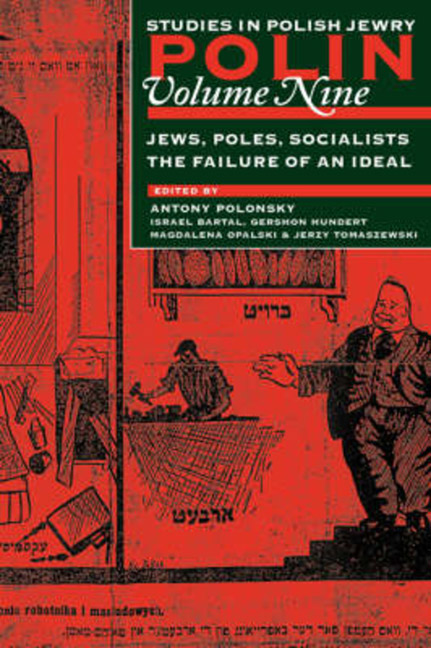Book contents
- Frontmatter
- Dedication
- Editors and Advisers
- Preface
- Acknowledgement
- Polin
- Polin: Studies in Polish Jewry
- Contents
- Note on Transliteration, Names, and Place Names
- Abbreviations
- Introduction
- PART I POLES, JEWS, SOCIALISTS: THE FAILURE OF AN IDEAL
- PART II NEW VIEWS
- PART III REVIEWS
- REVIEW ESSAYS
- BOOK REVIEWS
- Alfred Ebenbauer and Klaus Zatloukal (eds.), Die Juden in ihrer mittelalterlichen Umwelt
- Rivka Schatz-Uffenheimer, Hasidism as Mysticism
- Jadwiga Maurer, ‘Z matki obcej … ’
- Władyslaw T. Bartoszewski and Antony Polonsky (eds.), The Jews in Warsaw
- Maria Klańska, Problemfeld Galizien in deutschsprachiger Prosa 1846-191
- Israel Oppenheim, Tenuat Heḥaluts bePolin, 1929-1939
- The Letters of Martin Duber, ed. Nahum N. Glatzer and Paul Mendes-Flohr
- Alexander Heider, A Dictionary of Jewish Surnames from the Russian Empire
- Alice L. Eckardt (ed.), Burning Memory
- Ruta Sakowska, Ludzie z dzielnicy zamkniętej
- lwona Irwin-Zarecka, Neutralizing Memory
- Stanislaw Meducki and Zenon Wrona (eds.), Antyzydowskie wydarzenia kieleckie, 4 lipca 1946
- Bibliography Of Polish-Jewish Studies, 1993
- Notes on Contributors
- Notes on Translators
- Glossary
- Index
lwona Irwin-Zarecka, Neutralizing Memory
from BOOK REVIEWS
- Frontmatter
- Dedication
- Editors and Advisers
- Preface
- Acknowledgement
- Polin
- Polin: Studies in Polish Jewry
- Contents
- Note on Transliteration, Names, and Place Names
- Abbreviations
- Introduction
- PART I POLES, JEWS, SOCIALISTS: THE FAILURE OF AN IDEAL
- PART II NEW VIEWS
- PART III REVIEWS
- REVIEW ESSAYS
- BOOK REVIEWS
- Alfred Ebenbauer and Klaus Zatloukal (eds.), Die Juden in ihrer mittelalterlichen Umwelt
- Rivka Schatz-Uffenheimer, Hasidism as Mysticism
- Jadwiga Maurer, ‘Z matki obcej … ’
- Władyslaw T. Bartoszewski and Antony Polonsky (eds.), The Jews in Warsaw
- Maria Klańska, Problemfeld Galizien in deutschsprachiger Prosa 1846-191
- Israel Oppenheim, Tenuat Heḥaluts bePolin, 1929-1939
- The Letters of Martin Duber, ed. Nahum N. Glatzer and Paul Mendes-Flohr
- Alexander Heider, A Dictionary of Jewish Surnames from the Russian Empire
- Alice L. Eckardt (ed.), Burning Memory
- Ruta Sakowska, Ludzie z dzielnicy zamkniętej
- lwona Irwin-Zarecka, Neutralizing Memory
- Stanislaw Meducki and Zenon Wrona (eds.), Antyzydowskie wydarzenia kieleckie, 4 lipca 1946
- Bibliography Of Polish-Jewish Studies, 1993
- Notes on Contributors
- Notes on Translators
- Glossary
- Index
Summary
It is not easy to review a book towards whose creation, at the risk of sounding immodest, I made a contribution, spending many hours in discussion with its author, who in her turn praises my work (though some inaccuracies can be found in her accolades). It may not be possible to maintain an appropriate level of objectivity, even more so because this review will be enthusiastic. I would very much like the book to be translated and published in Poland.
I shall begin with a few corrections of inaccuracies regarding my own work. On p. l 62 the author describes my experience in uncovering the bloody history of postwar Polish-Jewish relations. I conducted my first ethnographic research in 1975 (not 1974 as stated), and at that time I heard from the inhabitants of Lezajsk of the murder by a group of partisans (Polish or Ukrainian, of unknown political orientation, led by a certain ‘Wolyniak’) of about fifteen Jewish repatriates, who had arrived in the town under the protection of the Red Army. I knew then of the Kieke pogrom, and that it was not the only incident of that type after the war. When I continued my research in 1984, my questionnaire included questions about the postwar fate of surviving Jews. The results were shocking: in the area surrounding the town of Przeworsk, in south-eastern Poland, Jews were murdered after the war in nearly every town. This fact, not sufficiently documented by historians, reaches the consciousness of Poles with difficulty, which is not so strange. I felt, however, and still do, that above all, Poles should hear this truth; this is why I wished to publish the results of my research first in Poland and not abroad-not because I feared that it would be misunderstood. The publication of my work in Poland was not, however, easy to achieve at that time: it would not have passed the censors before 1989. That is why I decided to publish an English version through the Center for Research on the History and Culture of Polish Jews at the Hebrew University of Jerusalem; unfortunately, this has yet to appear in print.
- Type
- Chapter
- Information
- Jews, Poles, Socialists: The Failure of an Ideal , pp. 299 - 302Publisher: Liverpool University PressPrint publication year: 2008

